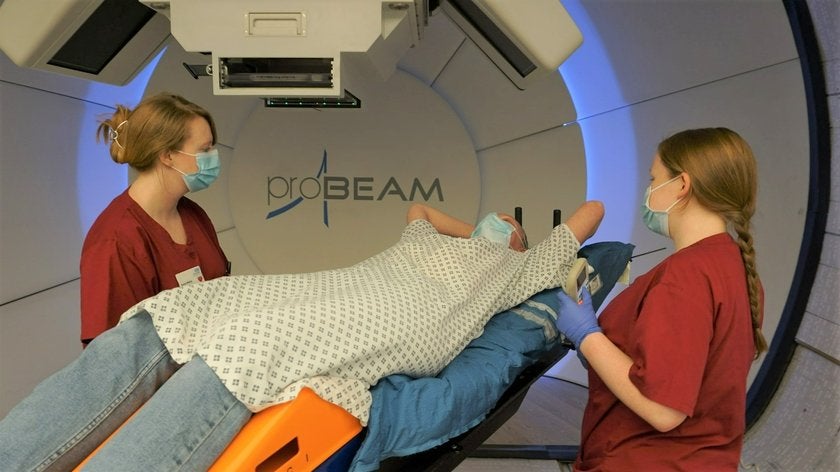UK breast cancer patients undergo proton beam therapy in world-first trial on NHS
Researchers hope targeted treatment could reduce risk of future heart problems in certain patients

Proton beam therapy has been used to treat breast cancer patients, in a world-first NHS trial to determine its promise as an alternative to radiotherapy.
Standard radiotherapy is very effective and provides few side effects for most of the 30,000 breast cancer patients who receive the treatment each year, according to Professor Charlotte Coles, an oncology consultant at Addenbrooke’s Hospital.
But for a small minority of around 500 patients each year, radiotherapy can pose at least a two per cent or greater potential lifetime risk of heart problems, which occur in less than 1 per cent of recipients.
This group will be offered to take part in Parable – the new NHS trial led by Prof Coles, set to involve 192 patients across 22 UK sites – to establish whether proton beam therapy could be a “better option”.
Proton beam therapy uses charged particles instead of X-rays to target tumours more precisely, and researchers hope it will allow doctors to deliver the required dose of radiotherapy where it’s needed, while minimising the radiation delivered to the heart, and without increasing the risk of early side effects such as skin redness and changes in breast appearance.
It is currently only available to NHS cancer patients at two centres in London and Manchester and is significantly more expensive than standard radiotherapy. Mainly used to treat children with brain tumours, there have so far been no large trials for breast cancer patients.
Those enrolled on the trial will receive either standard radiotherapy or proton beam therapy, and will record their experiences using questionnaires so that researchers can assess side effects, including skin reactions, breast pain and swelling.
The trial will measure the radiation dose delivered to the heart as an early predictor of possible heart problems, to avoid the need for lengthy follow-ups for many years before results are available.
“Using this early predictor will allow us to uncover the potential benefits of using proton beam therapy for long-term heart health in years rather than decades,” said Professor Judith Bliss, from The Institute of Cancer Research.
One of the first recruits is Kim Jones, a 44-year-old from Ely in Cambridgeshire, who was diagnosed with cancer last February after noticing some thickening of the skin and painful twinges in her breast.
Having already received chemotherapy, a mastectomy and lymph node removal at Addenbrooke’s, Ms Jones was accepted onto the Parable trial and commenced proton beam therapy at The Christie NHS Foundation Trust in Manchester on 24 October.
“When I was told that I’d been accepted onto the trial, I felt very lucky to have the opportunity to get this treatment,” said Kim. “Clinical trials are incredibly important as they are the best way to evaluate which treatments work the best.”
The risk of radiotherapy causing heart problems in later life is very small, and is typically because patients’ breast tissue and lymph nodes are located close to the heart, or because they already have an increased underlying risk of developing heart problems.
However, the average radiotherapy dose that the heart is likely to receive can be estimated and, together with age and other medical history, this information is used to predict the potential small lifetime risk of heart problems.
While proton beam therapy has been used to treat breast cancer in other countries, the number of participants in these trials has been small, and there have been no reported trials directly comparing proton beam therapy with standard radiotherapy.
Prof Coles said: “Although only a very small group of people are affected by a higher risk of heart problems later in life, it can still be a serious issue.
“Most patients treated with radiotherapy have decades of healthy life ahead of them and we need to do everything we can to avoid possible future heart problems related to treatment.”
Subscribe to Independent Premium to bookmark this article
Want to bookmark your favourite articles and stories to read or reference later? Start your Independent Premium subscription today.

Join our commenting forum
Join thought-provoking conversations, follow other Independent readers and see their replies